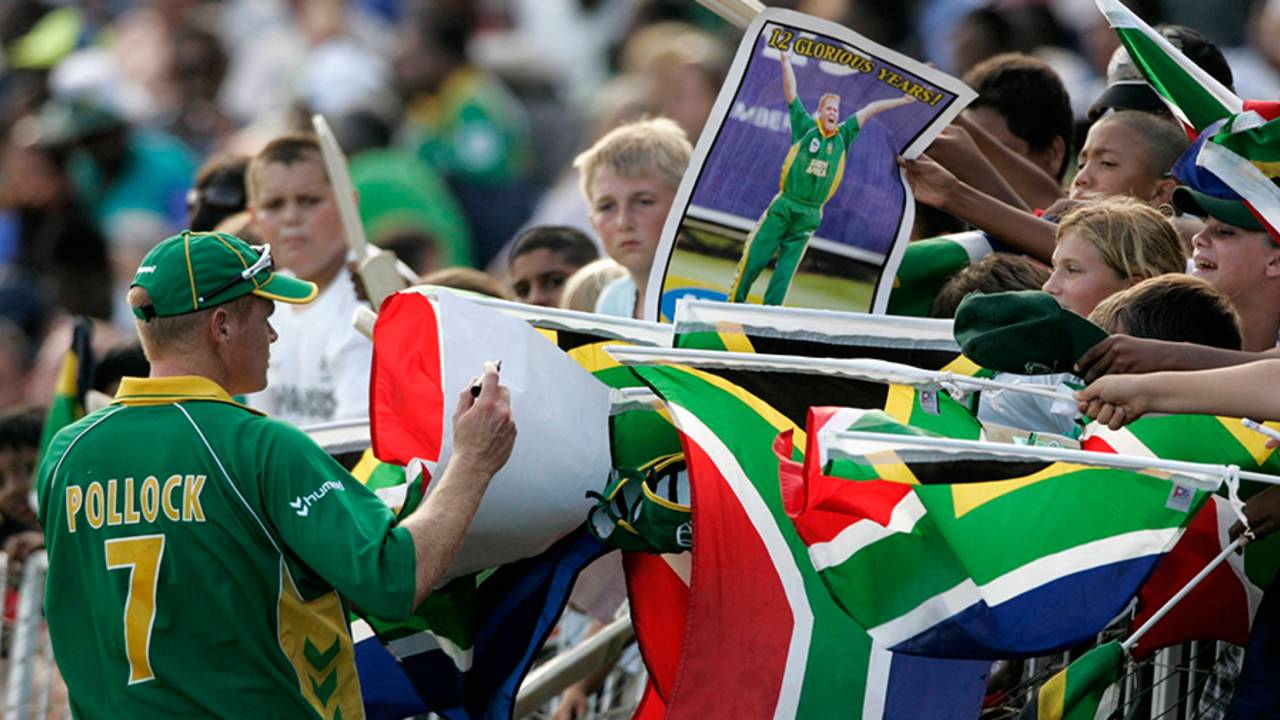No captaincy, no problem
Five players who remained key members of their teams after losing the captaincy
Karthik Krishnaswamy
04-Jan-2017
Shaun Pollock was a critical member of South Africa's line-up, in all formats, long after he lost the captaincy • Getty Images
MS Dhoni, who has announced he is stepping down from India's limited-overs captaincy, is 35 and has just endured a poor 2016 with the bat, averaging just 27.80 in ODIs. But he may yet go on to enjoy a second wind, as these five players of recent vintage showed after they lost or gave up the captaincy at not dissimilar stages of their careers.
Thrust into captaincy in April 2000 following Hansie Cronje's match-fixing life ban, Pollock spent three years in the job before South Africa's early, tragicomic exit from their home World Cup in 2003 prompted the selectors to hand the captaincy to a 22-year-old opening batsman named Graeme Smith. Pollock remained a world-class new-ball operator until his retirement in 2008, taking 143 Test wickets at 27.79 and 125 ODI wickets at 28.08 after losing the full-time captaincy.

Nasser Hussain ended his Test career with a match-winning fourth-innings hundred at Lord's•Getty Images
The man who replaced Pollock as South Africa captain went on to enjoy a long career studded with tours of England that ended the tenures of his opposite numbers. He would do the same, later, to Michael Vaughan and Andrew Strauss, but his first victim was Nasser Hussain, who resigned after the first Test of the 2003 series against Graeme Smith's Proteas. Hussain only played a further 12 Tests until he retired, but went out with a bang, scoring his runs at a better average than he did overall, and signing off with a triumphant, unbeaten fourth-innings Lord's hundred against New Zealand.

Sourav Ganguly took back the captaincy for a short while, ceremonially, in his last Test match•AFP
After five years at the helm, Sourav Ganguly lost the captaincy following a spat with India's then coach Greg Chappell during their tour of Zimbabwe in September 2005. By February 2006, he was out of the team as well, and, at 33, his career seemed finished. But he was back by December, and starting from his comeback series in South Africa in 2006-07, he scored 1991 runs at 46.30 - significantly better than his career average of 42.17 - with four hundreds and 10 fifties, before retiring with scores of 102 and 85 in his final series, at home against Australia.

Seven years after the worst crisis of his career, Younis Khan remains key to Pakistan's batting fortunes•Getty Images
Three months after leading Pakistan to the 2009 World T20 title, Younis Khan captained them for the last time, in an ODI against New Zealand in Abu Dhabi in November 2009. In March 2010, following Pakistan's horror tour of Australia, the PCB banned him for an indefinite period. He was 32 then, and his international future looked bleak. But he was nowhere close to being done: since his return to the team, he has been a pillar of Pakistan's Test team, scoring 4593 runs at 56.01, and has gone on to become their highest run-getter.

Pictures of Ross Taylor's tongue-out celebration remain in frequent circulation long after he gave up New Zealand's captaincy•AFP
When he resigned from New Zealand's captaincy instead of accepting a proposal that would split it between him and Brendon McCullum, Ross Taylor took a sabbatical from cricket, missing the tour of South Africa in 2012-13. He had been in superb form before losing his captaincy, scoring 142 and 74 in his last game in charge, a rare New Zealand win on Sri Lankan soil, but no one knew how he would be affected by the management mess he had gone through. It turned out his batting wasn't too badly affected: he has averaged over 50 in both Tests and ODIs since losing the captaincy.
Karthik Krishnaswamy is a senior sub-editor at ESPNcricinfo
